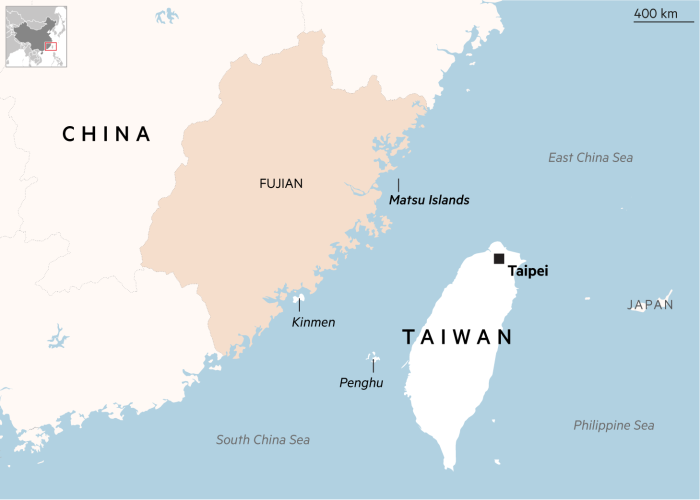[ad_1]
On a still evening this month, the deep rumbling of a Chinese commercial sand dredger could be heard across the water from Nangan, the largest of Taiwan’s Matsu Islands.
“They are coming back after the monsoon season,†said Mao-Chen Tsai of the Matsu coastguards, explaining that the number of illegal sand dredgers had risen in recent weeks following a hiatus during the stormy weather.
Last month, Tsai’s team expelled 59 illegal dredgers and sand-transportation vessels from the shallow waters around Matsu, less than 10km from the Chinese province of Fujian.
The ships are digging up sand to feed China’s infrastructure boom and land reclamation projects in its coastal cities, which have pushed up prices for the world’s most-used commodity after water.
But analysts warn that the dredgers are also being deployed to threaten the 13,000 Taiwanese islanders.
“This is psychological warfare,†said Su Tzu-yun, an analyst at the Institute for National Defense and Security Research, a think-tank backed by Taiwan’s defence ministry.
He argued that the privately operated sand dredgers were part of Beijing’s “grey-zone tacticsâ€, designed to wear down the islands’ defensive capabilities and intimidate the population without resorting to military force.
Taiwanese officials added that the dredgers were destroying the marine environment, causing Matsu’s beaches to recede and accelerating the decline of the fishing stock.
The dredgers, weighing between 1,000 and 9,000 tonnes and up to 100 metres in length, are concentrated in the waters between Nangan and Xiju islands, primarily outside the restricted area.
But in the past month, the ships have been regularly spilling into waters over which Taiwan claims jurisdiction, stretching 6km from Matsu’s coastline. The dredgers have been expelled by the coastguard with water cannon, forcing them to return to China.

The uptick in incursions comes despite Taiwan raising sentences for illegal sand dredging to a maximum of seven years in jail, along with a fine of NT$100m ($3.6m).
But officials complain that Matsu lacks the resources to pursue each dredger. According to Tsai, “at the worst point last year, there were hundreds of ships in our waters . . . but we confiscated twoâ€.
Analysts said that profits from selling sand outweighed the risks of losing the dredger and paying workers stuck in Taiwanese prisons. Su estimated that, in one day, a 5,000-tonne ship could fill the equivalent of three Olympic-sized swimming pools with sand, which could sell for $55,000.
Beijing has limited dredging activity in its own waters to protect its marine ecology, pushing Chinese boats into waters that Taiwan says it controls and exploiting conflicting territorial and maritime claims.
Lii Wen, a Matsu opposition politician, said the Chinese coastguards were inconsistent in responding to Taiwan’s complaints about dredging intrusions. The Chinese coastguards did not respond to a request for comment.
Beijing asserts that democratic Taiwan is part of its territory, a claim rejected by Taipei. Taiwan says its various islands, including the Matsu group, are part of a de facto sovereign nation. As tensions over Taiwan’s status have increased over the past year, the People’s Liberation Army has conducted almost daily operations, sending warplanes into Taiwan’s air defence identification zone.

“Now, these huge titans are intruding into Taiwan’s waters and wearing down our coastguards,†said Lii. Last year, Matsu’s small fleet of 100-tonne coastguard boats drove almost 4,000 vessels from the waters surrounding Matsu.
“It is difficult for Taiwan to respond adequately to this challenge. We’re allowing the destruction of our environment if we do nothing,†added Lii.
“Still, if we respond with military force to crack down on civilian dredgers, then it could give China a pretext to further escalate tensions in the Taiwan Strait.â€
In 2020, dredgers cut an undersea communication cable six times, disrupting internet and telecoms connectivity for the 736 residents of Xiju island. One Taiwanese official, who did not want to be named, told the Financial Times that the incidents raised alarm in the capital: “We did not know if China was cutting off communications before making more serious moves against Matsu.â€
A representative from Chunghwa Telecom, the principal network provider for Matsu, said there was no evidence that the cables were intentionally cut. Still, security analysts say the incidents should be viewed in the context of rising Chinese cyber attacks on Taiwan.
Until the recent reappearance of the dredgers, Matsu officials were optimistic that a series of joint combat operations in October and November between the Taiwanese and Chinese coastguards had put an end to the illegal activity.
Such efforts stand in marked contrast to the radio silence between leaders of both countries after Beijing shut down a cross-strait communication channel with Taipei following Tsai Ing-wen’s first presidential election victory in 2016.
On the islands, residents are angry and complain that their fishing industry is under threat as the sand that sustains the marine life is excavated and shipped to China. “Our fishermen are bearing the brunt of the dredging,†said a local official, who did not want to be named.
He continued: “Matsu used to be a fishing paradise, with waters brimming with diverse species of fish and shellfish. The dredgers have devastated the marine ecology. Our fishermen now struggle to make a living from the sea.â€
[ad_2]
Source link






